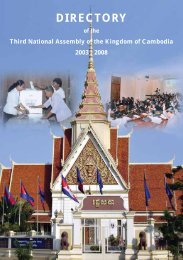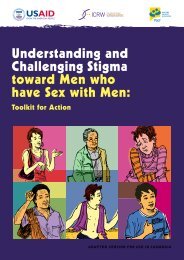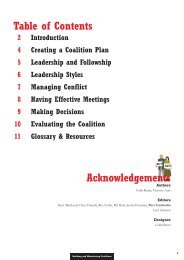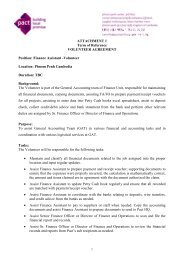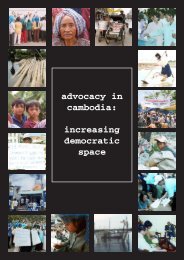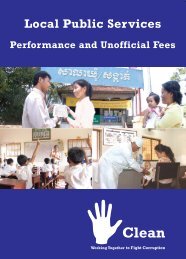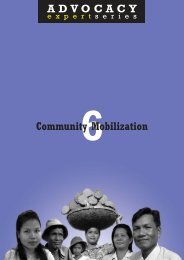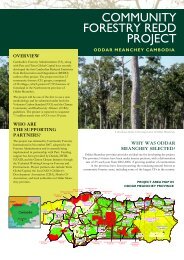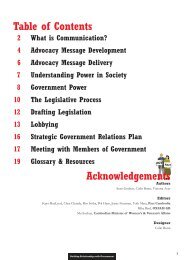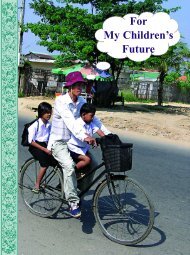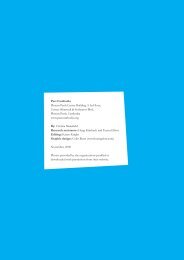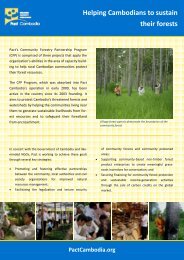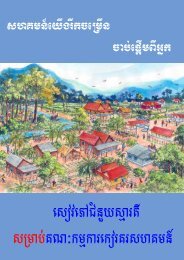Our Country Our Future - Pact Cambodia
Our Country Our Future - Pact Cambodia
Our Country Our Future - Pact Cambodia
You also want an ePaper? Increase the reach of your titles
YUMPU automatically turns print PDFs into web optimized ePapers that Google loves.
<strong>Our</strong> <strong>Country</strong><br />
<strong>Our</strong> <strong>Future</strong><br />
Clean<br />
Working Together to Fight Corruption
What is the Clean Hand?<br />
The "Clean Hand" represents the fight against corruption. The white represents purity, and the blue<br />
background represents wisdom. The logo is not associated with any political party, and it is not<br />
owned by any one organization.<br />
The Clean Hand campaign provides education and awareness activities aimed at reducing corruption in <strong>Cambodia</strong>. This<br />
campaign involves the use of publications, radio shows, television, posters and many other materials.<br />
Acknowledgements<br />
The Centre for Social Development and <strong>Pact</strong> <strong>Cambodia</strong> would like to thank all of the public servants that provided<br />
valuable feedback on the content of this handbook and who also gave us permission to use their photographs.<br />
Produced by:<br />
Centre for Social Development<br />
No. 19, Street 57, Sangkat Boeung Keng Kang I, Phnom Penh<br />
Kingdom of <strong>Cambodia</strong><br />
Tel: 023 364 735<br />
info@csdcambodia.org<br />
http://www.csdcambodia.org<br />
Supported by:<br />
This publication is made possible by the generous support of the American people through the United States Agency<br />
for International Development (USAID) and the Danish Government through the Danish International Development<br />
Agency (DANIDA). The contents are the responsibility of the Centre for Social Development and do not necessarily<br />
reflect the views of USAID or the United States Government, Danida, <strong>Pact</strong> or Padco.<br />
<strong>Our</strong> <strong>Country</strong> <strong>Our</strong> <strong>Future</strong><br />
Edition 1<br />
© September 2006<br />
We encourage you to copy part or all of this guide and to share it with others.
Table of Contents<br />
Introduction<br />
Everyone has the Equal Right to Government Services<br />
Corruption is a Problem in <strong>Cambodia</strong><br />
What is Corruption?<br />
Every Day the Government Loses $1 million of our<br />
Money to Corruption<br />
Why is there Corruption in <strong>Cambodia</strong>?<br />
Corruption Affects Everyone<br />
<strong>Our</strong> Actions as Public Servants Affect Everyone<br />
Corruption is Illegal<br />
We Can Make a Difference<br />
Fighting Corruption Starts with Me<br />
How Can I Help Fight Corruption?<br />
Reducing Corruption Benefits Everyone<br />
Fighting Corruption Takes Courage<br />
How and Where to Report Corruption<br />
Case Studies<br />
Clean Hand Treaty<br />
4<br />
6<br />
8<br />
10<br />
14<br />
15<br />
16<br />
18<br />
20<br />
21<br />
22<br />
27<br />
30<br />
31<br />
32<br />
39<br />
45<br />
Who is this handbook for?<br />
This handbook is designed to educate all public officials and individuals vested with an elective public office in<br />
<strong>Cambodia</strong> about what corruption is and how to fight it. Public officials include all individuals appointed to<br />
permanent or temporary positions in the legislative or executive branches, the military, and government<br />
administrative or judicial offices. Individuals vested with an elective public office include any member of the<br />
Senate, National Assembly, Commune Councils and any citizen vested with a public office by election. This<br />
handbook also contains information that will be useful to all members of the public.<br />
<strong>Our</strong> <strong>Country</strong>, <strong>Our</strong> <strong>Future</strong><br />
3
Introduction<br />
The rights of all citizens in <strong>Cambodia</strong> are determined by the constitution. All citizens have the equal right to<br />
access government services such as education, healthcare, and social security.<br />
It is the duty of the government and all public<br />
servants to serve the people of <strong>Cambodia</strong> and treat<br />
them in a fair and equal way.<br />
Corruption undermines the rights of every<br />
<strong>Cambodia</strong>n by preventing the government and<br />
public servants from serving the people equally.<br />
Corruption destroys the trust of <strong>Cambodia</strong>n citizens<br />
in the government and public servants, and in each<br />
other.<br />
Corruption is a widespread problem, but this does<br />
not mean that it is viewed as morally or socially<br />
acceptable. There is nothing in our culture that<br />
makes corruption a fact of life that we cannot<br />
change.<br />
We must avoid all types of<br />
corruption in all situations.<br />
Everything we do is to<br />
serve and protect the<br />
interests of our society and<br />
the <strong>Cambodia</strong>n people.<br />
We must avoid providing<br />
benefits to those who want<br />
us to commit injustice, any of our family<br />
members or yes-men. The Royal Palace is not a<br />
secret place for the <strong>Cambodia</strong>n people.<br />
[unofficial translation]<br />
His Majesty Samdech Preah Boromneath<br />
Norodom Sihamoni King of <strong>Cambodia</strong>,<br />
October 2004<br />
This handbook looks at different types of corruption and how it affects our families and communities, as well as<br />
the steps that we as public servants can take to reduce corruption.<br />
Corruption is not something that can be wiped out immediately - it will take a long time. But if we do not start<br />
now, the future of our children and our country will never improve.<br />
Corruption in different levels - small, medium or large scale - always has negative<br />
impacts on society. Corruption affects efficiency in production as well as the<br />
implementation of laws.Without virtue in their conduct, some individuals and public<br />
servants involved in activities that are against their duties. This transforms public<br />
relations to some kind of affairs between individuals for the sake of private<br />
interest to the detriment of public interest. This is against the fact that public<br />
servants' duties are to serve the people and the state.<br />
Samdech Hun Sen, Opening Remarks at the Ceremony of the Seminar on the<br />
Draft Law on Anti-Corruption in <strong>Cambodia</strong> and International Standards - 17-18 August 2005<br />
4<br />
<strong>Our</strong> <strong>Country</strong>, <strong>Our</strong> <strong>Future</strong>
Services<br />
Services<br />
Services<br />
Services<br />
Fighting corruption<br />
starts with you<br />
<strong>Our</strong> <strong>Country</strong>, <strong>Our</strong> <strong>Future</strong><br />
5
Everyone has the Equal Right to Access<br />
Government Services<br />
The rights of all <strong>Cambodia</strong>ns are the same, and they are contained in the constitution.<br />
Every Khmer citizen shall be equal before the law, enjoying the same rights, freedom and<br />
fulfilling the same obligations regardless of race, color, sex, language, religious belief,<br />
political tendency, birth origin, social status, wealth or other status. (Article 31)<br />
Khmer citizens of either sex shall enjoy the right to choose any employment according to<br />
their ability and to the needs of the society. Every Khmer citizen shall have the right to obtain<br />
social security and other social benefits as determined by law. (Article 36)<br />
Khmer citizens of either sex shall have the right to participate actively in the political,<br />
economic, social and cultural life of the nation. Any suggestions from the people shall be<br />
given full consideration by the grant of the State. (Article 35)<br />
6<br />
<strong>Our</strong> <strong>Country</strong>, <strong>Our</strong> <strong>Future</strong>
The health of the people shall be guaranteed. Poor citizens<br />
The State shall protect and upgrade citizens' rights to quality<br />
education at all levels and shall take necessary steps for quality<br />
education to reach all citizens. (Article 65) The State shall<br />
Citizens shall receive education for at least 9 years. (Article 68)<br />
The law shall protect life, honor, and dignity of the citizens. (Article 38)<br />
shall receive free medical consultation in public hospitals,<br />
infirmaries and maternities. (Article 72)<br />
provide free primary and secondary education to all citizens in public schools.<br />
<strong>Our</strong> <strong>Country</strong>, <strong>Our</strong> <strong>Future</strong><br />
7
Corruption is a Problem in <strong>Cambodia</strong><br />
<strong>Cambodia</strong> is ranked as one of the most corrupt countries in the region. A study in 2005 by the international<br />
organization Transparency International ranked <strong>Cambodia</strong> 130 out of 158 countries in the Corruption<br />
Perceptions Index. <strong>Cambodia</strong>'s rank was based on opinion survey of how <strong>Cambodia</strong>ns perceive corruption.<br />
Corruption is a problem in all<br />
countries in the world<br />
Least<br />
Corrupt<br />
1 Iceland<br />
59 Thailand<br />
77 Laos<br />
107 Vietnam<br />
130 <strong>Cambodia</strong><br />
155 Myanmar<br />
Most<br />
Corrupt<br />
158 Bangladesh<br />
8<br />
<strong>Our</strong> <strong>Country</strong>, <strong>Our</strong> <strong>Future</strong>
A study from 2005 found that <strong>Cambodia</strong>ns are concerned that all public servants are<br />
corrupt and many citizens do not use local government services. According to the<br />
<strong>Cambodia</strong>n people, the courts, the taxation system, the customs department , and the<br />
police are the most corrupt parts of the government. The likelihood of paying bribes<br />
when having contact with the judge/courts is 100%, for the police excluding the traffic<br />
police it is 67%, for traffic police alone it is 50%, and likewise 50% for the customs<br />
department.<br />
In May 2005, the Ministry of National Assembly-Senate Relations and Inspection<br />
released a report called "Past Achievements and Work Plans for 2005" that looked at<br />
nine cases of corruption investigated by the Ministry. They found that the total<br />
amount of money diverted from government revenue from these cases was<br />
$US 22,452,600.<br />
In 2005, the Economic Institute of <strong>Cambodia</strong> (EIC) surveyed 100 large companies<br />
operating in <strong>Cambodia</strong> to identify the most significant constraints to doing business in<br />
<strong>Cambodia</strong>. Corruption was listed by 80% of those interviewed as their number one<br />
concern, as it prevented them from expanding, importing and exporting their goods,<br />
employing new staff and conducting new activities.<br />
In 2006, the Economic Institute of <strong>Cambodia</strong> (EIC) conducted another survey with<br />
about 1,200 private sector enterprises. The report found that on average the private<br />
sector pays about 2.8 percent of their annual turnover in unofficial fees. This amount<br />
is equal to $US330 million in 2005. This amount does not include unofficial fees paid<br />
by import-export companies to custom officers, port and other public officials during<br />
goods clearance, nor by companies who have received government contracts.<br />
<strong>Our</strong> <strong>Country</strong>, <strong>Our</strong> <strong>Future</strong><br />
9
What is Corruption?<br />
Corruption is an illegal use by a individual of their function, duty, power or influence to obtain personal benefits,<br />
in the form of money, objects or other materials, for that person, or for any other person or entity.<br />
Corruption not only happens when powerful people profit illegally but also when people take small gifts. The<br />
amount of money involved or the level of your position does not matter - it is still corruption.<br />
Small or large -<br />
it is still corruption<br />
According to the draft Anti Corruption law and international standards such as the United Nations Convention<br />
Against Corruption, there are several different types of corruption:<br />
Bribery<br />
Bribery occurs when a person gives or receives a gift or reward directly or indirectly (such as through a friend or<br />
family member) to get a public official or a citizen invested with an elective public office to:<br />
- refrain from doing their normal duties<br />
- perform a duty that should be done for free<br />
- perform their duties faster than normally required<br />
- influence their decisions<br />
Examples<br />
- Asking for extra money for a service to pay for paper, copying, stamps, transportation, food, and cigarettes, etc.<br />
- Receiving money to speed up the approval of a permit or license<br />
- Receiving money from someone so they avoid a fine for an illegal activity (eg speeding, illegal fishing, illegal<br />
logging)<br />
- Asking for money for a service at a health centre that should be free (such as tuberculosis treatments)<br />
- Paying someone to vote for a specific political party in an election<br />
- Receiving a gift or money for providing a public service<br />
10<br />
<strong>Our</strong> <strong>Country</strong>, <strong>Our</strong> <strong>Future</strong>
Abuse of Power<br />
Extortion occurs when a public official or a citizen invested with an elective public office uses force or<br />
intimidation to obtain money or things of value from other individuals.<br />
Examples<br />
- Setting up an illegal check point on a road and demanding payment for goods or people to pass<br />
- Demanding money to resolve a conflict<br />
- Threatening a student that they will fail an exam or subject if they do not pay money<br />
- Threatening to arrest a criminal unless they pay money<br />
Fraud<br />
Fraud is criminal deception or false representation to obtain an unfair advantage.<br />
Examples<br />
- Receiving a salary for a job that you are not doing<br />
- Recording and receiving reimbursement for false expenses<br />
- Deliberately inflating the cost of goods that were purchased with government funds, and keeping the<br />
difference<br />
- Keeping the money allocated for employees sick and personal leave<br />
What you do, you<br />
will get it back<br />
<strong>Our</strong> <strong>Country</strong>, <strong>Our</strong> <strong>Future</strong><br />
11
Nepotism or Favoritism<br />
Nepotism occurs when a public official or a citizen invested with an elective public office gives special treatment<br />
or priority to their friends or relatives for appointments, promotions, service, awarding of contracts etc.<br />
Examples<br />
- Hiring or promoting someone that is part of our family<br />
- Transferring a friend to a more popular location or more lucrative position within our department<br />
- Only hiring or promoting employees that belong to our political party<br />
- Deciding not to prosecute an offender because he or she comes from an influential family<br />
Embezzlement<br />
Embezzlement is the wrongful diversion or fraudulent appropriation of a deed, a title, public funds, private<br />
funds or any other item by a public official or a citizen invested with an elective public office for their own use.<br />
Examples<br />
- Using commune council funds to buy a new motorbike<br />
- Using funds from an NGO project budget to buy our family a new mobile phone<br />
- Keeping government revenue (fees, taxes etc.) for our own personal use and not recording it<br />
- Keeping a government computer for our family to use at home<br />
- Using a government car for personal use<br />
The vision being pursued is that of a public administration that is neutral, more operational,<br />
productive, competent, transparent, responsible and closer to the people, while being of reasonable<br />
size and receiving an adequate level of remuneration. Fulfilling such a vision is a long-term process<br />
that can only be achieved gradually with determination and discipline.<br />
National Program of Administrative Reform - Serving People Better, Council for Administrative<br />
Reform, November 2004<br />
12<br />
<strong>Our</strong> <strong>Country</strong>, <strong>Our</strong> <strong>Future</strong>
Trading of Influence<br />
To ask for or accept, directly or indirectly, any gifts or benefits from a person or organization that would like to<br />
receive an honor or any other favorable decision from a public official, citizen invested with an elective public<br />
office, or organization.<br />
Examples<br />
- Receiving money to provide a promotion or transfer to an employee<br />
- Receiving a gift from an accused criminal to provide them with a favorable judgment in court<br />
- Receiving money to approve a contract with the private sector that does not follow established procedures<br />
- Receiving money to bestow a special title (such as okhna)<br />
Conflict of Interest<br />
A family, financial, political, or other personal interest, that may influence, or appear to influence the<br />
performance of a public official’s or a citizen invested with an elective public office’s duties.<br />
Examples<br />
- Not providing medical treatment to a patient and referring them to a private clinic that belongs to you<br />
- Recommending that a government office lease an item (such as a house, car, or moto) that belongs to you<br />
- Awarding the contract for a government project to a company that belongs to a friend or relative<br />
- Approving the development of an area where you own land<br />
- Resolving a dispute that involves a friend or family member<br />
Corruption increases<br />
if corrupt acts are<br />
not punished<br />
<strong>Our</strong> <strong>Country</strong>, <strong>Our</strong> <strong>Future</strong><br />
13
Every Day the Government Loses $1<br />
Million of our Money to Corruption*<br />
$1 million = 1 can of rice per day for every person in <strong>Cambodia</strong>¹<br />
$1 million = Enough money to build 50 new 5 room schools²<br />
$1 million = The monthly salary of 25,000 public servants³<br />
* This estimate is taken from the research report "<strong>Cambodia</strong>n Corruption Assessment", Casals & Associate/USAID, 2004, p. 1<br />
¹ Based on a cost of 300 Riel for a can of rice<br />
² Based on the cost of a 5 room school being $20,000<br />
³ Based on an average monthly salary of 160,000 Riel<br />
14<br />
<strong>Our</strong> <strong>Country</strong>, <strong>Our</strong> <strong>Future</strong>
Why is there Corruption in <strong>Cambodia</strong>?<br />
There are many different reasons why corruption is such a big problem in our country.<br />
Greed and materialism - wanting more and more money because it is easy to obtain<br />
Status and influence - people using their power to demand special treatment<br />
Abuse of power - officials threatening citizens or their employees if they do not pay them<br />
corrupt money<br />
Weak governance - money is not managed in an open and transparent way<br />
Impunity - a belief that corrupt acts will not be properly investigated or punished<br />
Relationships and patronage - having to be loyal to our party, boss, family or friends<br />
Threats - receiving threats from our colleagues or superiors to pay them corrupt money<br />
Jealousy - seeing all of our colleagues benefiting when you are not<br />
Hopelessness - feeling like the problem of corruption can never be solved<br />
Lack of awareness - people do not fully understand what corruption is or what its<br />
consequences are<br />
Lack of information - people are not aware of what the official fees for a service are<br />
Powerlessness - when people know that they are being cheated and do not know how to<br />
report corruption<br />
Violence - people pay bribes for security and safety<br />
Gratitude - thanking someone for a service that they have provided as part of their job<br />
It is our duty to serve the<br />
people of <strong>Cambodia</strong>, not<br />
anyone else<br />
<strong>Our</strong> <strong>Country</strong>, <strong>Our</strong> <strong>Future</strong><br />
15
Corruption Affects Everyone<br />
“For every 10,000 Riel we earn from our<br />
farm, we lose at least 500 Riel to bribes and<br />
corruption”<br />
“Every day when I go to school and give<br />
money to my teachers or when I watch my<br />
parents pay bribes to government officials,<br />
I learn that corruption is acceptable”<br />
“I cannot receive the proper medical<br />
treatment because I have to pay fees to the<br />
Health Centre staff even though the<br />
services are supposed to be free”<br />
“I cannot get my goods to the market<br />
because the company that made the road<br />
did not build to the high quality that it<br />
promised in the contract”<br />
“I have a degree from a good university<br />
and a lot of useful skills, but I cannot afford<br />
the payments required to get promoted to<br />
the position I deserve”<br />
“I am ashamed because I have to ask for<br />
payments from my students to feed my<br />
family”<br />
16<br />
<strong>Our</strong> <strong>Country</strong>, <strong>Our</strong> <strong>Future</strong>
“Corruption is the number one problem for<br />
all businesses in <strong>Cambodia</strong>. Bribes eat<br />
away at my profit and I cannot expand my<br />
business and employ more people”<br />
“I have just graduated from university but I<br />
cannot afford to pay the bribes to get a<br />
good job in the government”<br />
“When there is corruption public servants<br />
will have no confidence in each other or<br />
among friends”<br />
“Whenever I go to the police or the<br />
commune office to get help they ask for a<br />
bribe, and I do not have enough money”<br />
Corruption destroys our<br />
children's future<br />
<strong>Our</strong> <strong>Country</strong>, <strong>Our</strong> <strong>Future</strong><br />
17
<strong>Our</strong> actions as Public Servants Affect Everyo<br />
As a public servant, we represent the government. We are linked to every other public servant and citizen in<br />
<strong>Cambodia</strong>. If we are corrupt, it affects everybody in <strong>Cambodia</strong>.<br />
If we are corrupt it creates a bad reputation<br />
for all public servants<br />
If we refuse to provide a free service to a<br />
person we make them lose faith in their<br />
government<br />
<strong>Our</strong> Actions as<br />
If we demand money for a service that is<br />
free, we are preventing a very poor person<br />
from accessing the service<br />
If we do not collect the proper fees, we are<br />
diverting money that could be used to pay<br />
for another public servant's salary<br />
18<br />
<strong>Our</strong> <strong>Country</strong>, <strong>Our</strong> <strong>Future</strong>
ne<br />
If we demand money for a position we are<br />
lowering the morale of qualified youth who<br />
cannot find jobs<br />
If we accept bribes from a rich person and<br />
serve them first, we may be denying an<br />
important service to a poor person who<br />
needs the service more<br />
Civil Servants<br />
If we take a bribe to stop a criminal<br />
investigation or to release a criminal early<br />
from jail, we are putting our children and<br />
all <strong>Cambodia</strong>ns citizens at greater risk of<br />
theft, robbery, rape and murder<br />
If we take a bribe we set a bad example for<br />
our children<br />
If we give a job to a person that has paid<br />
money, we are preventing someone else who<br />
may be more qualified from getting the job<br />
If we are part of the<br />
problem, we are part<br />
of the solution<br />
<strong>Our</strong> <strong>Country</strong>, <strong>Our</strong> <strong>Future</strong><br />
19
Corruption is Illegal<br />
Existing laws in <strong>Cambodia</strong> allow officials to prosecute corrupt activities. The UNTAC Criminal Law and<br />
Procedure (1992) contains articles relating to comprehensive active and passive bribery offenses:<br />
Article 37 - Embezzlement by<br />
Public Officials<br />
1. Any elected official, civil servant, military personnel or<br />
official agent of any of the four <strong>Cambodia</strong>n parties to the<br />
Paris Agreement, or any political official who, while<br />
performing official duties or tasks related to such duties,<br />
with a view to owning or using, misappropriates, sells,<br />
rents, embezzles for personal profit or for that of a third<br />
party, property, services, money, personnel, any advantage,<br />
document, authorization or any function belonging to<br />
any public authority, is guilty of the felony of<br />
embezzlement of public property and shall be liable to<br />
imprisonment for a term of three to ten years.<br />
2. The court may remove the convicted person from<br />
elective office and may also prohibit him or her, after serving the sentence, from<br />
standing for election or from holding any position in the public administration for a period of two years.<br />
3. The penalty for this felony shall also include a fine of double the sum of money or value of the property<br />
embezzled.<br />
Article 38 - Corruption<br />
1. Without prejudice to possible disciplinary action, any civil servant, military personnel or official agent of<br />
any of the four <strong>Cambodia</strong>n parties to the Paris Agreement, or any political official who, while performing<br />
official duties or tasks related to such duties, solicits or attempts to solicit or who receives or attempts to<br />
receive property, a service, money, staff, a professional position, a document, an authorization or any<br />
benefit in exchange for any one of these same elements is guilty of the felony of extortion and shall be<br />
subject to a punishment of three to seven years in prison.<br />
2. The court may remove the convicted person from elective office and may also prohibit him or her, after<br />
serving the sentence, from standing for election or from holding any position in the public administration<br />
for a period of two years.<br />
3. The penalty for this felony shall also include a fine of double the sum of money or value of the property<br />
extorted.<br />
Article 58 - Bribery<br />
Any person who corrupts or attempts to corrupt any elected official, civil servant, military personnel, or official<br />
agent of any of the four <strong>Cambodia</strong>n parties to the Paris Agreement or of any registered political party who, while<br />
performing official duties or tasks related to such duties, by promising property, service, money, staff, professional<br />
position, document, authorization or any benefit whatsoever in exchange for any one of these same benefits is<br />
guilty of bribery and shall be liable to a punishment of one to three years in prison.<br />
20<br />
<strong>Our</strong> <strong>Country</strong>, <strong>Our</strong> <strong>Future</strong>
We Can Make a Difference<br />
As public servants we can help reduce corruption:<br />
We want our families and communities to lead a better life<br />
We represent the government<br />
We have a responsibility for the transparent and accountable use of public funds<br />
We have a responsibility to uphold the high moral and ethical values of <strong>Cambodia</strong>n society<br />
We have a responsibility to set a good example to the people we serve<br />
We are part of the problem, so we are part of the solution<br />
The key thrust of the Royal Government of <strong>Cambodia</strong>'s strategy to fight corruption is to take<br />
concrete actions that attack the roots of corruption. The implementation of the anti-corruption<br />
strategy will be supported with enough tools and resources to prevent and to substantially crack<br />
down on corrupt entities.<br />
The priorities of the Royal Government to combat corruption during its third mandate are to:<br />
- Streamline the delivery of public services to reduce opportunities for corrupt practices<br />
particularly in areas related to trade, commerce and investment.<br />
- Establish a Citizen's Bureau as a check and balance mechanism to reduce corrupt practices.<br />
- Develop and enforce codes of ethics for the public sector.<br />
- Improve transparency of public tenders and contract award procedures.<br />
- Continue to strengthen Public Financial Management.<br />
"Implementing The Rectangular Strategy and Development Assistance Needs", Government<br />
Position Paper<br />
<strong>Our</strong> <strong>Country</strong>, <strong>Our</strong> <strong>Future</strong><br />
21
Fighting Corruption Starts with Me<br />
You have just made a wrong<br />
turn, you must pay a fine.<br />
Can I just give you<br />
this money instead?<br />
No I will not take<br />
your money.<br />
You must take this<br />
receipt to the office and pay the fine.<br />
22<br />
<strong>Our</strong> <strong>Country</strong>, <strong>Our</strong> <strong>Future</strong>
Your baby will be better now he has<br />
had the injections.<br />
Can I give you a gift to<br />
thank you for helping him?<br />
No, I will not take any gifts. It is my job to serve<br />
you and give you the best care I possibly can.<br />
Teacher, my parents want<br />
me to pass the next exam.<br />
No, I will not take your money. You can<br />
study hard and you will get good grades.<br />
<strong>Our</strong> <strong>Country</strong>, <strong>Our</strong> <strong>Future</strong><br />
23
How can I find out about the<br />
money our Commune Council is<br />
spending?<br />
There is a notice board outside the office that has the<br />
Commune Investment plan.<br />
You can see the planned activities and<br />
budget for the next year here.<br />
In all circumstances, in all places and at all times, the teacher is always a good model for the<br />
citizens. The public never considers acts of the teacher as individual, but as the acts of all teachers<br />
Code of Conduct of the Teacher, 1995-1996, p. 8<br />
The Royal Armed Forces, Military Police and Police must not commit or be accomplices in corrupt<br />
practices. They must report to their superiors, and not abuse their public power for private gain.<br />
Code of Conduct of the Royal Armed Forces, Military Police and Police published by the<br />
<strong>Cambodia</strong>n Institute of Human Right, 2002, pp. 10, 21 and 26<br />
24<br />
<strong>Our</strong> <strong>Country</strong>, <strong>Our</strong> <strong>Future</strong>
Here are the application<br />
forms for my car registration.<br />
The price is $22 including all fees,<br />
and it will take one week.<br />
If I can give you extra, can I get my<br />
registration sooner?<br />
No, I will not take the money.<br />
You can see here that<br />
everyone pays the same fees.<br />
<strong>Our</strong> <strong>Country</strong>, <strong>Our</strong> <strong>Future</strong><br />
25
You should make sure that<br />
I win the case.<br />
I will not take your money. If you have a good<br />
case and you did no wrong you will win.<br />
Can we use this money to buy<br />
some drinks? I am very thirsty.<br />
No! You cannot!<br />
Every riel that we collect belongs to the<br />
<strong>Cambodia</strong>n people.You should record that<br />
payment in the ledger.<br />
26<br />
<strong>Our</strong> <strong>Country</strong>, <strong>Our</strong> <strong>Future</strong>
How Can I Help Fight Corruption?<br />
Fighting corruption is not easy. We all work in an environment where it is difficult to change our behavior, and<br />
many things are beyond our control. We may face pressure from our colleagues and our family to keep being<br />
corrupt.<br />
If we want to fight corruption, we will have to make special sacrifices and overcome many obstacles.<br />
If we have courage and the desire to make our country's future more prosperous, we can make a difference.<br />
There is always something we can do to fight corruption. And it does not matter whether the changes we make<br />
affect 1 or 1000 people - we still make a positive difference.<br />
Fighting corruption is about changing our attitudes and behavior, and establishing rules and systems that prevent<br />
and punish corrupt acts in our own workplace. Below are some suggestions for how we can fight corruption<br />
together:<br />
Provide clearly visible and easy to understand information to the public<br />
about official fees (such as a notice board in your office or brochures)<br />
Provide information to the public about the time it takes for each service<br />
to be processed by your office<br />
Always provide accurate and official receipts to citizens and give a<br />
duplicate copy to the finance officer in your office<br />
Record all payments in your office's ledger<br />
<strong>Our</strong> <strong>Country</strong>, <strong>Our</strong> <strong>Future</strong><br />
27
Be open in providing members of the community with<br />
official budgets, expenditures and documents<br />
Encourage citizens to participate in planning<br />
and monitoring of local development projects<br />
Set up a staff accountability committee to<br />
address issues of corruption at work<br />
?<br />
What can this Committee do?<br />
- Discuss why there is corruption in your office<br />
- Talk about what type of behavior related to corruption you think is acceptable and<br />
unacceptable<br />
- Figure out what procedures can be changed or improved to reduce corruption<br />
- Develop ways for better promotion of official fees and procedures to members of the public<br />
- Establish procedures for the ongoing monitoring of the collection of payments and staff<br />
expenditure<br />
- Develop a code of conduct that can be signed by all staff in your office<br />
Distribute copies of code of conducts, official rules and procedures to<br />
your colleagues and put them in public places in your office<br />
Amend existing codes of conduct to include corruption<br />
Ask your manager as a group to see copies of your office budget<br />
28<br />
<strong>Our</strong> <strong>Country</strong>, <strong>Our</strong> <strong>Future</strong>
Ask your manager to inform all staff about<br />
their sick and personal leave entitlements<br />
Vote for election candidates who are clean and<br />
promise to fight corruption<br />
Teach your children about corruption and its effects and tell them that<br />
everyone in <strong>Cambodia</strong> has the same right to access public services<br />
Sign the Clean Hand Treaty (see the back of this handbook)<br />
and distribute it to your work colleagues<br />
Speak to a union or the civil servant association to find out about the<br />
advocacy activities they are doing to increase public servant salaries<br />
Case study - What happens when salaries are raised?<br />
It is very important that all public servants have enough money to look after their family, but raising<br />
salaries does not automatically reduce corruption. Raising salaries may make public servants' jobs<br />
highly desirable. For example, a public servant earning 30 dollars per month will not worry about<br />
losing his job if he can earn the same as a moto driver, but will want to keep his job if the salary is<br />
increased to 60 dollars per month.When salaries for public servants are increased, it is very<br />
important to also introduce systems that will monitor corruption and punish public servants for<br />
corrupt acts. If the policeman does not fear losing his job, he will continue to take bribes at the<br />
same rate, while earning an even higher official salary. In 2005, the government increased the<br />
salary of court officials - but there was no major decrease in corruption in the court system<br />
afterwards<br />
<strong>Our</strong> <strong>Country</strong>, <strong>Our</strong> <strong>Future</strong><br />
29
Reducing Corruption Benefits Everyone<br />
When the government receives and distributes its revenue in a fair and accountable fashion, there will be:<br />
Improved education and health<br />
care services for our family<br />
Greater income and more food<br />
for our families<br />
More jobs in the future for<br />
our children<br />
Smaller gap between<br />
rich and poor<br />
Greater trust in the government<br />
Equal and affordable access<br />
to all government services<br />
30<br />
<strong>Our</strong> <strong>Country</strong>, <strong>Our</strong> <strong>Future</strong>
Fighting Corruption Takes Courage<br />
Fighting corruption is not easy - its takes courage.<br />
We may find that we will face opposition and criticism from our colleagues. It is natural for us to feel a fear of<br />
threats or losing our jobs.<br />
If everyone starts to change their behavior individually and as a group - we will have a better future for our<br />
children and our country.<br />
<strong>Our</strong> <strong>Country</strong>, <strong>Our</strong> <strong>Future</strong><br />
31
How and Where to Report Corruption<br />
If you suspect that there is corruption within your office, you have the right to report the corruption to internal<br />
or external authorities. There are several different things that you can do to report corruption:<br />
- Talk to your colleagues about why they are behaving in a corrupt manner<br />
- Try to collect evidence about the corruption (write a record of corrupt activities in a book, or make copies<br />
of relevant documents)<br />
- Inform your manager about the corrupt acts<br />
- Report the corruption to one of the organizations listed below. You can either write to these organizations<br />
or call them. In some cases, your reports can be anonymous if you need to protect yourself from threats.<br />
Government Agencies<br />
There are several levels of government that you can approach regarding corruption.<br />
Ministry of National Assembly and Senate Relations and Inspection (MoNASRI)<br />
Under the "Law on Establishment and Function of Ministry of National Assembly and Senate Relations and<br />
Inspection", MoNASRI has the power to:<br />
- Initiate and assign inspectors to inspect all public sectors including Ministries; Secretariats; Municipalities;<br />
Provinces; public administration institutions, and public enterprises to ensure the implementation of laws<br />
and regulations<br />
- Enforce measures against public wrongdoing and corruption by public servants; army officials; national<br />
police whose actions negatively affect the development of the nation<br />
- Call for explanation from related persons through the relevant authority to give testimony to inspectors.<br />
- Temporarily halt any activities, public or private, that negatively impact national interest and submit the case<br />
to the head of the Royal Government<br />
- Submit to the head of Government for approval to prosecute any person or legal entity found committing<br />
serious grievances against the national interest<br />
Contact:<br />
N° 126, Samdech Sothearos, Phnom Penh<br />
Tel: 023 221 491 / Tel: 023 884 254 / Tel: 023 882 761<br />
32<br />
<strong>Our</strong> <strong>Country</strong>, <strong>Our</strong> <strong>Future</strong>
Anti-Corruption Unit, Office of the Council of Ministers<br />
The Anti-corruption Unit was established in August 2006 to prevent corruption, strengthen laws related to<br />
corruption, and educate the public about the combating corruption.<br />
The Investigation Unit of the Anti-corruption Unit is responsible for:<br />
- Receiving complaints and investigating information related to corruption<br />
- Conducting research and collecting documents related to corruption and reporting them to the leaders of<br />
the Anti-corruption Unit<br />
- Cooperating with relevant authorities to conduct field investigations into any cases of embezzlement,<br />
exploitation of state property, the loss of national budget funds and other corrupt activities<br />
- Monitoring documents and national budget revenue/expense activities and the use of national and<br />
international aids at the ministries, state secretariats, institutions, local authorities of the provincial and<br />
municipal offices, public administrative establishments, public enterprises, and state owned enterprises in<br />
order to conduct assessment, assumption, and propose measures to its leader<br />
The Law Enforcement Promotion Unit is responsible for:<br />
- Studying and analyzing complaints of corruption with the relevant ministries/institutions to determine the<br />
crime and then request for approval from its leader<br />
- Cooperating with the Investigation Unit and relevant units and judicial police in completion of formality<br />
for referring the case and send the offender to the court under procedure in force<br />
- Following up and monitoring the law and regulation enforcement by the Royal Government and by the<br />
ministry/institution to ensure the integrity, efficiency, and transparency, and accountability<br />
The Education, Prevention, Elimination, and Cooperation Unit is responsible for::<br />
- Developing an action plan on the combating corruption based on the vision, policy program, rectangular<br />
strategy and national development plan<br />
- Cooperating with the relevant ministries/institutions in organizing meetings, national and international<br />
seminars, and creating awareness programs for dissemination to the public on the consequences of<br />
corruption<br />
- Providing education on codes of ethics to civil servants, local authorities, pupils, students, the armed forces,<br />
and the general public<br />
Contact:<br />
Office of the Council of Ministers<br />
N° 41, Confederation de la Russie, Phnom Penh, <strong>Cambodia</strong><br />
Tel: 023 880 619 or 023 881 307<br />
<strong>Our</strong> <strong>Country</strong>, <strong>Our</strong> <strong>Future</strong><br />
33
Commission on Interior, National Defense, Investigation, Anti-Corruption, and Public<br />
Service Administration<br />
This National Assembly Commission administers complaints that are received from both the general public and<br />
from Members of the National Assembly. The complaints it receives are examined and are passed on to the<br />
appropriate Ministries.<br />
Contact:<br />
# 71, Samdech Sothearos Blvd, Phnom Penh<br />
Telephone: 023 215 938<br />
Name Position Party Telephone<br />
H.E. Mr. Yim Sovann Chairman 012 788 999<br />
H.E. Mr. Pal Sam Oeun Vice-Chairman 012 551 611<br />
H.E. Mr. Som Chen Secretary 012 804 572<br />
H.E. Mr. Sin Pinsen Member 012 935 882<br />
H.E. Mr. Hul Savorn Member 012 723 224<br />
H.E. Mr. Sim Soly Member 012 842 184<br />
H.E. Mr. Koy Dok Member 012 635 959<br />
H.E. Mr. Chrea Sochenda Member 012 957 097<br />
H.E. Mrs. Chem Savay Member 012 940 919<br />
Commune/Sangkat Fund Accountability Working Groups<br />
The Commune/Sangkat Fund Accountability Working Groups in each province and municipality are responsible<br />
for managing complaints about and conduct investigations into the misuse of the Commune/Sangkat funds.<br />
Any member of the public or the government can submit confidential reports about the misuse of the<br />
Commune/Sangkat funds. Contact details for the Commune/Sangkat Fund Accountability Working Groups in<br />
each province and municipality are on the next page.<br />
34<br />
<strong>Our</strong> <strong>Country</strong>, <strong>Our</strong> <strong>Future</strong>
Banteay Meanchey 016 892 972<br />
Battambang 012 627 547<br />
Kampong Cham 012 974 476<br />
Kampong Chhnang 016 872 305<br />
Kampong Speu 012 808 589<br />
Kampong Thom 012 957 573<br />
Kampot 012 247 334<br />
Kandal 011 557 890<br />
Koh Kong 012 786 240<br />
Kratie 012 194 7603<br />
Mondul Kiri 012 726 594<br />
Oddar Meanchey 011 696 337<br />
Pailin 011 906 633<br />
Phnom Penh 016 832 086<br />
Preah Vihear 012 962 202<br />
Prey Veng 011 759 250<br />
Pursat 012 914 353<br />
Ratanak Kiri 012 629 125<br />
Siem Reap 012 589 305<br />
Sihanouk Ville 016 898 350<br />
Stung Treng 012 439 435<br />
Svay Rieng 011 872 206<br />
Takeo 011 746 665<br />
Other ways to Report Corruption<br />
Government agencies are not the only ways of drawing attention to acts of corruption. There are other groups<br />
of people that you can approach.<br />
!<br />
Practical Tips<br />
- Try to collect some evidence first (such as copied documents, photographs)<br />
- Try to write down a history of how and when the corruption occurred<br />
- Ask your colleagues who support you if they would also be willing to speak about the issue<br />
- Try to work with other people - it is possible to break one chopstick but not many<br />
- Do not put yourself at risk - reporting corruption can sometimes be very dangerous<br />
Donors<br />
If you are aware of corruption within a government project that is being funded by a donor, you can contact the<br />
donor directly. All donors are always very interested in finding out if their funds are not being used correctly<br />
and would be happy to talk to you.<br />
<strong>Our</strong> <strong>Country</strong>, <strong>Our</strong> <strong>Future</strong><br />
35
Media<br />
The media regularly write stories about issues of corruption. If you are aware of an act of corruption that<br />
affects a large number of people, you can contact a local radio or newspaper journalist who might be interested<br />
in investigating the story. There have been many examples where an investigation by the media has been<br />
publicized and led to official investigations being launched into corruption cases.<br />
Case Study - Working with the Media to reduce Corruption<br />
In early 2006, a journalist from Rasmei Kampuchea began receiving complaints from contract<br />
teachers who were being told they had to pay bribes to get a full-time government paid teaching<br />
job. The promises of a full-time position were false. The journalist began interviewing other<br />
teachers and discovered that more than 500 teachers were affected. These teachers were often<br />
forced to sell their cows, farmland, and other property to pay<br />
the $300-$400 bribes for jobs they never received.<br />
On 14 March 2006, Rasmei Kampuchea published a lengthy<br />
story investigating the claims of corruption which included<br />
the demands by the teachers that this wrong be made right,<br />
and that those responsible be punished.<br />
The day after the article was published, Prime Minister Hun<br />
Sen said in a speech at a graduation ceremony at the<br />
National Institute of Education in Phnom Penh that, "I saw an<br />
article printed about contract teachers in Battambang province being swindled…Officials must go<br />
down to conduct an investigation."<br />
One week following the Prime Minister's public remarks about the corruption, government<br />
authorities sent an investigation team from the Ministry of Education to Battambang. They discovered<br />
the problem was even worse than reported in Rasmei Kampuchea, and that nearly 1,000 contract<br />
teachers in the province were cheated. The report was then submitted for review to government<br />
officials.<br />
On May 26, the Ministry of Education disciplinary committee decided to dismiss the provincial<br />
official who solicited bribes from contract teachers in exchange for the promise of full-time teaching<br />
positions. The Ministry of Education later sent another team of investigators to Battambang province<br />
to determine other provincial and district level officials who were part of the scandal. The Ministry<br />
of Education also issued enhanced policies regarding hiring.<br />
36<br />
<strong>Our</strong> <strong>Country</strong>, <strong>Our</strong> <strong>Future</strong>
Contact details for major media organizations are below.:<br />
Newspapers<br />
Koh Santepheap Daily<br />
No. 240, St. 271, Sangkat Beung Tumpun, Phnom Penh Tel: 023 211 818, 012 866 686<br />
Rasmei Kampuchea Daily<br />
No 474, Preah Monivong, Sankat Boeung Trabek, Phnom Penh Tel: 023 362 472<br />
Kampuchea Thmey Daily<br />
N° 805, Kampuchea Krom, Phnom Penh Tel: 023 882 990<br />
Moneaksekar Khmer<br />
N° 15A, Street 293, Phnom Penh Tel: 012 850 690, 012 550 955<br />
Samleng Yuvachun Khmer<br />
N° 23Eo Street 374, Phnom Penh Tel: 012 900 664, 012 859 142<br />
<strong>Cambodia</strong> Today<br />
N° 21E1 Republique Populaire de Pologne (St. 163), Phnom Penh Tel: 023 217 000<br />
Somne Thmey<br />
No. 6, Street 288, 12302 Phnom Penh Tel: 023 224 303, 012 550 110<br />
Phnom Penh Post<br />
No. 10A, Street 264, Phnom Penh Tel: 023 426 568, 023 210 309<br />
Cambodge Soir<br />
No. 26CD, Street 302, Sangkat Beoung Keng Kang I, Phnom Penh, Tel: 012 462 092, 012 790 880<br />
Radio and Television<br />
Radio FM 102 Women's Media Centre of <strong>Cambodia</strong><br />
No. 30, Street 488, Phnom Penh Tel. 023 212 264, 023 726 556<br />
Radio FM 105 MHz<br />
No. 44G, Street 360, Sangkat Boeung Keng Kang III, Phnom Penh Tel: 023 210 401<br />
Radio Free Asia<br />
No. 63 EoE1, Street 240, Sangkat Chey Chumneah, Phnom Penh Tel: 023 982 403, 023 722 380<br />
Voice of America<br />
No. 521, Street 99, Phnom Penh Tel: 023 426 666, 012 847 356<br />
<strong>Our</strong> <strong>Country</strong>, <strong>Our</strong> <strong>Future</strong><br />
37
Voice of Democracy<br />
No. 42, Street 242, Sangkat Chak Tonulk, Phnom Penh Tel: 023 221 596, 092 921 902<br />
<strong>Cambodia</strong>n Television Network (CTN)<br />
National Road 5, Khan Rusey Keo, Phnom Penh Tel: 023 999 434, 012 800 843<br />
Bayon Radio & Television<br />
N° 3 Chakrey Nhek Tioulong (St. 466), Phnom Penh Tel: 023 726 617<br />
Kasekam Village, Sro Nge Commune, Siem Reap Tel: 092 971 713<br />
Apsara TV (11) & Radio FM 97MHz<br />
N° 69 Street 57 Corner Street 360, Phnom Penh Tel: 011 878 431, 012 828 666<br />
TV 5 <strong>Cambodia</strong> & Radio FM 98 MHz<br />
Tchecoslovaquie (St. 169) Borei Keila, Phnom Penh Tel: 023 303 925, 023 306 064<br />
TVK - National Television of Kampuchea<br />
N° 62 Preah Monivong, Phnom Penh Tel: 023 430 760<br />
38<br />
<strong>Our</strong> <strong>Country</strong>, <strong>Our</strong> <strong>Future</strong>
Case Studies<br />
The following case studies have been selected to provide you with an example of some of the new initiatives<br />
that the Royal Government of <strong>Cambodia</strong> is currently working on to reduce corruption and promote<br />
accountability and transparency in the public service.<br />
Commune/Sangkat Fund Accountability Working Groups<br />
In 2005 the government established Commune/Sangkat Fund Accountability Working Groups in each province<br />
and municipality to manage complaints about and conduct investigations into the misuse of the<br />
Commune/Sangkat funds. The Working Groups are made up of government representatives, commune<br />
councilors and public society members. Any member of the public or the government can submit confidential<br />
reports about the misuse of the Commune/Sangkat funds by:<br />
- Filling out the form contained in the Commune/Sangkat Accountability Working Group leaflets<br />
- Putting a written complaint in the accountability boxes located in every commune, and district and<br />
provincial level government offices<br />
- Contacting any member of the Commune/Sangkat Fund Accountability Working Group directly by phone<br />
or in person<br />
Form used for providing feedback to the Commune/Sangkat Accountability Working Group<br />
<strong>Our</strong> <strong>Country</strong>, <strong>Our</strong> <strong>Future</strong><br />
39
Case Study 1 - Siem Reap<br />
In October 2005, the Siem Reap Commune Council/Sangkat Accountability Working Group conducted an audit<br />
of the procurement of tree seedlings for a community forestry project in Pras Dak commune funded by Danida.<br />
The Working Group found that the deputy chief of the Natural Resources and Environment Management<br />
(NREM) unit of the provincial Executive Committee had been using the funding for his own personal use and<br />
invited him to discuss the issue further.<br />
?<br />
In November the Working Group met with the deputy chief to get more<br />
information and identify the other people involved in the case. At the meeting<br />
the deputy chief signed an agreement stating that he would pay back the<br />
2,280,000 riel ($570) that he took within a specific timeframe.<br />
After another meeting later that month to discuss how to proceed with<br />
the case, the Working Group prepared a case report for the Department<br />
of Environment on the irregular use of DANIDA funds which<br />
recommended legal measures, and further action.<br />
In December, the Working Group collaborated with the Department of<br />
Environment and the chief of NREM unit to hold a meeting with the deputy<br />
chief's parents to set a date of mid January for the return of the project funds.<br />
The final investigation found that the deputy chief of the NREM unit had fraudulently misused the NREM<br />
budget and also improperly used office equipment at his home. The Working Group decided to fire the deputy<br />
chief from his position and demanded the return of the misused budget funds and all the office equipment.<br />
40<br />
<strong>Our</strong> <strong>Country</strong>, <strong>Our</strong> <strong>Future</strong>
Case Study 2 - Kampong Speu<br />
Under the current national Seila structure, every provincial Executive Committee has an internal auditor. The<br />
internal auditor is an independent officer who is responsible for conducting investigations into the misuse of<br />
Provincial and Commune/Sangkat funds.<br />
In January 2006, the internal auditor in Kampong Speu received information about<br />
the misuse of Commune/Sangkat funds in several communes. The Executive<br />
Committee established a committee with the authority of the first deputy governor<br />
to investigate this complaint. The committee was comprised of the Internal<br />
Auditor, the Deputy Chief of the Provincial Local Administration Unit (PLAU),<br />
the Deputy Chief of the Technical Support Unit (under Ex/Com), a<br />
Partnership for Local Governance (PLG) advisor, and representatives<br />
from the District and Provincial Facilitation Teams.<br />
?<br />
This committee conducted a field investigation in 13 communes across 5<br />
districts. The committee found that 13 Commune/Sangkats had used<br />
forged receipts to purchase equipment (such as desks and chairs) and<br />
photocopy items that did not exist, or were not the same as the number delivered.<br />
The committee also found that there had been collusion between the Commune<br />
Council Chiefs, Commune Council Clerks and the suppliers to embezzle<br />
Commune/Sangkat administrative funds.<br />
The committee then submitted a report of their investigation to the Commune/Sangkat Fund Accountability<br />
Working Group. The Working Group held a meeting in February 2006 and reviewed the report and made the<br />
following recommendations:<br />
- The 13 Commune Councils that misused the funds had to use their own money to purchase the additional<br />
missing equipment for the Commune<br />
- The 13 Commune Councils should follow the Commune/Sangkat guidelines about procuring equipment<br />
and sharing the monthly financial report at Commune meetings<br />
- All Commune Councils in Kampong Speu should no longer purchase equipment from the two companies<br />
involved in the case<br />
The Working Group gave verbal warnings to the Commune and Treasury officials involved in this case. The<br />
Working Group also decided to widen the investigation to cover all the Commune Councils in Kampong Speu<br />
to find out if similar embezzlement had occurred.<br />
<strong>Our</strong> <strong>Country</strong>, <strong>Our</strong> <strong>Future</strong><br />
41
One Window Service Office, Siem Reap<br />
In 2005 the Ministry of Interior supervised the opening of a One Window Service Office in Siem Reap District<br />
in Siem Reap. The One Window Service Office is designed to provide a range of government services to<br />
citizens in a single location.<br />
The services offered at the One Window Service Office include:<br />
- Commerce (eg. registration of businesses)<br />
- Transport (eg. registration of motorcycles)<br />
- Mining industry and energy (eg. registration of handicraft shops and businesses in the mining<br />
sector)<br />
- Culture and fine arts (eg. distribution of licenses to photographers)<br />
- Tourism (eg. licensing of guesthouses up to five beds and restaurants up to 50 seats)<br />
The Office is managed by a director and a vice-director and staff are appointed in the same way as other district<br />
offices. Under Prakas No. 792 PR.K., officials serving in the One Window Service Office are prohibited from:<br />
- Taking administrative working hours to carry out other personal business.<br />
- Utilizing the power of the position held to influence others in order to take advantages of or threaten the<br />
people.<br />
- Doing any business which negatively affects the integrity of public servants.<br />
- Being a member of a board of directors or managing a company either directly or indirectly.<br />
- Having a second career in addition to the public servants duties.<br />
42<br />
<strong>Our</strong> <strong>Country</strong>, <strong>Our</strong> <strong>Future</strong>
Employees at the One Window Service Office are also prohibited<br />
from receiving any presents, gifts or any kinds of reward from<br />
citizens in return for fulfilling their jobs. Any attempted bribes are<br />
supposed to be reported immediately by the official to a higher<br />
authority and the director of internal auditing office.<br />
The One Window Service Office is divided into two sections - an<br />
administrative back office, and a public front office where all the<br />
transactions with the citizens are handled. In order to reduce<br />
opportunities for corruption, staff within the front office are divided<br />
into three groups:<br />
- Group 1 is in charge of receiving applications, delivering<br />
applications/results and supplying information directly to the<br />
people.<br />
- Group 2 is in charge of legalization of documents.<br />
- Group 3 is in charge of receiving the administrative service fees<br />
The One Window Service Office in Siem Reap has distributed many brochures to local community members<br />
outlining the services they offer. The brochures also contain information about administrative procedures,<br />
processing times, and service fees.<br />
A large information board with the official prices for each service is also located on the wall in the Front Office.<br />
This allows all the citizens that visit the office to clearly see which fee they have to pay for which service.<br />
Brochure explaining official fees at<br />
the One Window Service Office<br />
<strong>Our</strong> <strong>Country</strong>, <strong>Our</strong> <strong>Future</strong><br />
43
Once citizens have paid for a service at the cashier, they are given a<br />
receipt which is dated and signed by both the official and the citizen.<br />
A duplicate copy of the receipt is made using carbon-ink-paper and<br />
forwarded to the accounting office.<br />
Citizens or organizations visiting the office are able to make<br />
complaints about the One Window Service Office by putting a form<br />
in a complaints box in the front office. All complaints are managed<br />
by an ombudsman who is independent from the One Window Service<br />
Office. The ombudsman in Siem Reap district was elected in August<br />
2005 by a committee of representatives of the District Council, and<br />
NGOs. Under Prakas No. 790 PR.K the ombudsman cannot belong to any political party and cannot take any<br />
advice from or give any reports or information to the district governor.<br />
When conducting an investigation into a citizen's or organization's complaint, the ombudsman may inspect any<br />
document or interview any One Window Service Office staff.<br />
44<br />
<strong>Our</strong> <strong>Country</strong>, <strong>Our</strong> <strong>Future</strong>
Clean Hand<br />
Symbolic Treaty<br />
As citizens of the Kingdom of <strong>Cambodia</strong>, we are concerned about the threat that corruption poses to the stability and<br />
future of our country.<br />
We acknowledge that corruption:<br />
- Is one of the biggest challenges facing the future development of <strong>Cambodia</strong><br />
- Affects every individual in <strong>Cambodia</strong><br />
- Hurts the economy by preventing the growth of businesses and creating obstacles for potential investors<br />
- Endangers basic democratic values<br />
- Is a transnational phenomenon that affects all societies and economies<br />
- Cannot be blamed on any one person or thing<br />
Reducing corruption is a battle that can be won over time, and we feel that is the responsibility of every <strong>Cambodia</strong>n to<br />
fight for a cleaner and more prosperous country. A comprehensive and non-partisan approach is required to prevent<br />
and combat corruption effectively.<br />
We welcome the Royal Government of <strong>Cambodia</strong>'s commitment in the Rectangular Strategy for Development to<br />
fighting corruption and passing an international standard anti-corruption law. We also welcome the RGC's commitment<br />
to increased transparency and administrative reforms within the public sector.<br />
We give our support to the following ways of reducing corruption:<br />
- An anti-corruption law that contains penalties for corrupt activities and clear definitions<br />
- The establishment of an independent body to investigate and prosecute acts of corruption<br />
- Public involvement in the prevention and enforcement efforts<br />
- Provide protection for people who provide information in good faith to authorities about an act of corruption<br />
As a citizen of <strong>Cambodia</strong> we commit to do our part in fighting corruption so that our country will prosper and the<br />
children of <strong>Cambodia</strong> will have a brighter future.<br />
Signed,<br />
>>>>>>>>>>>>>>>>>>>>>>>>>>>>>>>>>>>>>>>>>>>>>>>>>>>>>>>>>>>>>>>>>>>>>>>>>>>>>><br />
This treaty is not associated with any political party or owned by any one organization
Produced by:<br />
Supported by:



